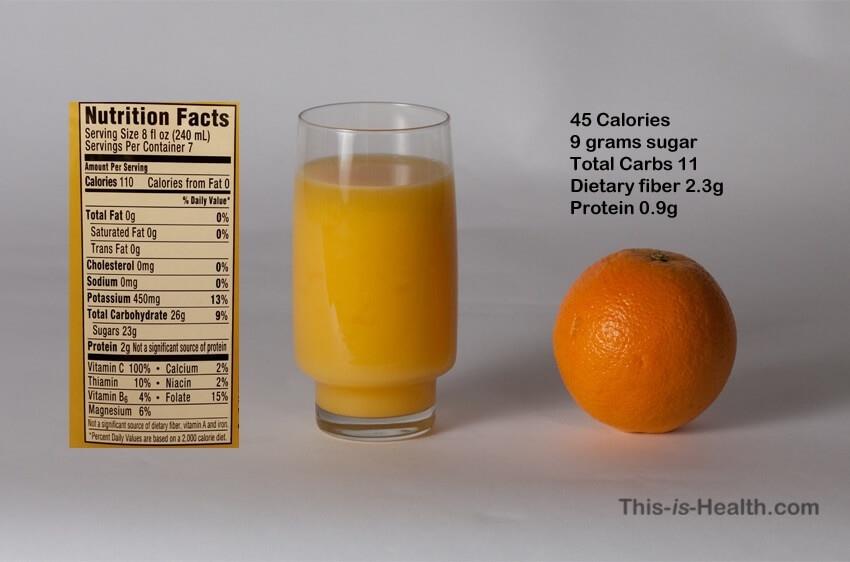
It's not just nutritionists who are concerned about sugary fruit juices dentists are too.
Apple juice vs orange juice drank more free#
"Like juicing, blending fruit in smoothies also releases the fruit sugars and so smoothies contribute to free sugar intake," she adds. However, store-bought smoothies are typically served in overly large portion sizes, Dr Moores says.

Milk-based smoothies also have the added nutritional benefits of protein and calcium from the milk.

Even the small pop-top style juice bottles popular with kids are usually 250ml, so that's two servings in one bottle.īlending whole fruit for smoothies does mean these drinks contain fibre. The recommended serving size for juice is only half a cup (125ml) - so just a few mouthfuls at most - which you should drink only occasionally, and not every day, according to dietary guidelines.īut fruit juices often come packaged in much larger containers. "You would never eat eight oranges in one sitting but it's actually very easy to consume them if you drink them in liquid form," she says. So how much juice is too much?ĭrinking juice is a fast way to add a whole heap of extra calories to your daily diet, says Dr Jones. So even though fruit juices might be labelled "no added sugar", just know they contain plenty of free sugars which could be harmful to your health if downed in greater amounts than recommended. In juice form, these free sugars, which are also found in honey, syrups and added to processed foods, give our bodies a quick sugar hit and carry with them the risks of tooth decay and unhealthy weight gain.ĭrinking fruit juice has also been linked to a higher risk of type 2 diabetes. "It's when fruits are juiced that the natural sugars within fruit become 'free' sugars," says Dr Moores. Normally, in whole fruit, these sugars are stored inside the plant's cells, so it takes our bodies longer to digest them. Juicing fruit releases simple sugars naturally found in fruit, such as fructose. The sugar content in juice can still be a problem even if there's "no added sugar". Juices contain free sugars that fruits don't "This means that it is quite easy to consume a large amount of juice in one go without feeling very full, so they are often a significant source of energy," says Dr Moores.Įven if fruit juices contain some pulp, they are still lower in fibre and less beneficial than eating whole fruits, she adds. And it's the fibre which is good for gut health and has a host of other health benefits, too.Ī red delicious apple, for example, has around 10 times more fibre than apple juice, says Carly Moores, a registered nutritionist at the University of Adelaide.įibre also makes you feel full, which means drinking sans-fibre fruit juices, no matter how thirst-quenching, is just less satisfying than eating fruit. Juicing extracts the sweet, sweet juice from fresh produce so fruit juices do contain most of the vitamins, minerals and good phytochemicals found in whole fruits.īut however your juice comes - cold-pressed, freshly squeezed, "nothing but" juice - juicing fruit strips out the fibre. If fruit juice is made from fruit, surely it contains the same goodness as whole fruit, right? "Consumers think of juice as a healthy alternative to soft drinks, but even 100 per cent fresh fruit juices contain a large amount of sugar that's inconsistent with a healthy diet," says Alexandra Jones, a food policy researcher at The George Institute of Global Health. However, in general, apple juice will always have more sugar than orange juice.Whether it's a popper in your kid's lunchbox, OJ at breakfast or blitzing a smoothie before you walk out the door, fruit juices are an easy way to pack more fruit into our days.Īnd when roughly half of us don't eat enough fruit, drinking juice might seem like a quick fix.Įxcept juice is not the healthy choice it's made out to be. For example, some apples are sweeter than others. The amount of sugar in apple juice and orange juice can vary depending on the type of fruit that is used. However, apple juice has more sugar than orange juice. They are both made from fruit, and they both contain sugar. Apple Juice Vs Orange Juice: Sugar ContentĪpple juice and orange juice are both popular types of fruit juice. Both orange juice and apple juice can be part of a healthy diet, but it is important to remember to limit the amount of juice you consume in a day since it is a source of natural sugar.

However, apples are also a healthy fruit choice and contain vitamins and minerals such as Vitamin C, potassium, and fiber.

See also How Long Can Grapefruit Juice Sit Out? 5 Easy Hacks To Make It Last Longer Is Orange Juice Healthier Than Apple Juice?Ī common belief is that orange juice is healthier than apple juice because oranges are a citrus fruit and are known to be high in Vitamin C.


 0 kommentar(er)
0 kommentar(er)
